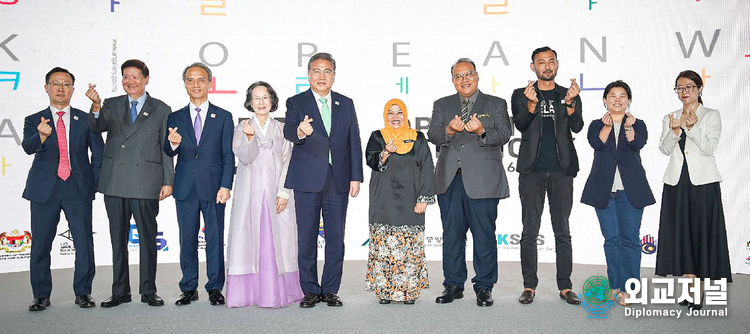
During his visit to Malaysia on May 2nd, Minister of Foreign Affairs Park Jin attended the opening ceremony of the 'Hallyu Exhibition' held at the National Art Gallery of Malaysia in Kuala Lumpur.
The opening ceremony of this exhibition, jointly hosted by the Embassy of the Republic of Korea in Malaysia and the National Art Gallery of Malaysia, was attended by more than 200 prominent figures, including Datuk Hajah Saraya, the Secretary-General of Ministry of Tourism, Arts, and Culture (MOTAC), and Amerrudin Ahmad, the Director General of the National Art Gallery.
The exhibition features a total of 10 themes of works created by artists from both countries on the theme of 'Hallyu (Korean Wave)', including fresco paintings, media art, and installation art, and will be exhibited for four months from May 1st to September 16th.
△ The past and present of Hallyu (Korean Wave) △ The influence of Hallyu (Korean Wave) in Malaysian daily life This exhibition was prepared with two themes: the past and present of Hallyu, and the influence of Hallyu on daily life in Malaysia. To express the influence of Hallyu on the daily lives of Malaysians, the exhibition received support from Korean companies and popular brands that have entered Malaysia, such as Samsung Electronics, Coway, and E-Mart 24, who sponsored exhibition items.
In his congratulatory speech, Minister Park emphasized that "Hallyu has become a major driving force for enhancing mutual understanding and friendly cooperation between the people of both countries," and he hoped that Hallyu in Malaysia would continue to develop as a part of daily life and lead to further cooperation between the two countries.
The exhibition is the first collaboration between the National Art Gallery of Malaysia and the Embassy of the Republic of Korea in Malaysia since the signing of the Korea-Malaysia Cultural Cooperation MOU in 2021. The event is a special exhibition that brings together young Malaysian artists and Korean veteran artists, leading to a two-way cultural cooperation that bridges the generation gap. Additionally, the exhibition aims to expand cooperation in areas where Korea has a competitive advantage, in line with the Korea-ASEAN Initiative (KASI) promoting creative industry development in the field of culture and the arts.







